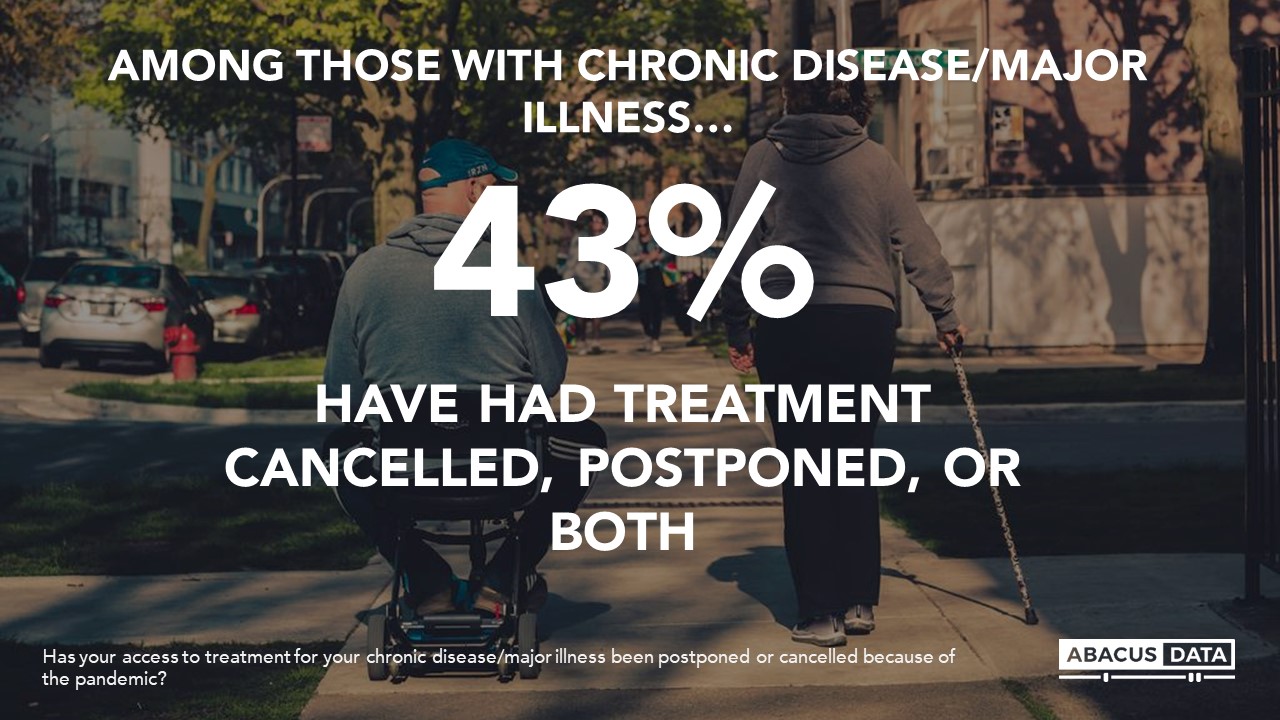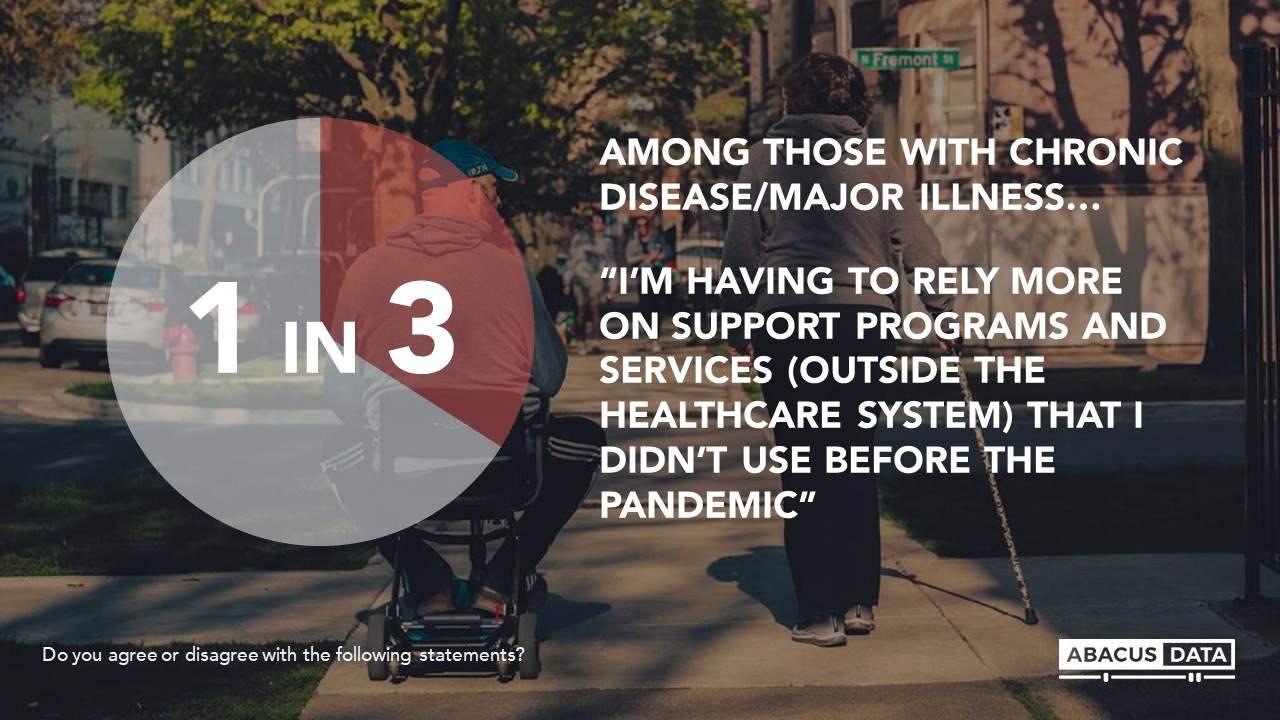The Silent Wave: Those with Chronic Disease/Major Illness, Their Caregivers & COVID-19
March 16, 2021
Earlier this year we conducted a study for HealthPartners, an organization connecting Canadians to Canada’s most respected and well-known health charities. The online survey fielded to a general population sample of n=3,000 and included those with chronic disease/major illnesses and their caregivers. The purpose of the study was to understand the impacts of the pandemic on these individuals and the role for health charities.
The COVID-19 pandemic has had an immeasurable impact on all of us including our health. Many of us have experienced changes to our physical and/or mental health in the past 11 months- whether we’ve had a close encounter with the virus itself or not. But the pandemic hasn’t touched all of us equally.
One such group that has felt unique and devastating impacts is Canadians with chronic disease/major illnesses and their caregivers. These individuals have lost access to services and supports they need most, and the impacts we’ve all felt from isolation are all the more stressful for these individuals.
On their own, the impacts felt by this group are worthy of concern. But they also hint at the long-term challenges to our healthcare system overall and are a warning signal about the need to start thinking of these challenges now.
1.Redirecting resources from chronic disease to COVID-19 in the healthcare system is having a direct impact on treatment plans. Two thirds of those living with chronic disease/major illness have faced some level of difficulty in accessing their care since the start of the pandemic.
This includes 43% who’ve had treatment for their chronic disease/major illness cancelled, postponed or both. 30% have experienced a cancelation regarding screening and diagnostic appointments.

2. Reallocating resources is already causing long-term consequences for individuals with chronic disease/major illness, including their mental health. Many see a direct link between their inability to access programs and services and their declining quality of life and the progression of their illness.
45% of those with a chronic disease/major illness say these delays and cancellations are having a direct impact on their quality of life. 50% say the inability to access services due to the pandemic has had a negative impact on their mental health.

These numbers are high. What was presumed to be a temporary reallocation of resource last March has been in effect in some way for the past 11 months. Most of us probably could have predicted some consequences from extending these measures but these numbers suggest some of the worst-case consequences are coming true. And still without regular access to programs and services for treatment, these numbers will likely worsen.
The direct impacts of cancelled and postponed treatments on mental health are notable in of themselves, but they are only compounding on pre-existing mental health implications of isolation. Many individuals with chronic disease/major illness are taking additional precautions because they are at a greater risk of contracting the virus, isolating themselves further.
3. Caregivers too have faced unprecedented challenges during this time. They have had a front-row seat to the experiences of their loved ones, and they have been left to carry a larger burden of care during this time.
Most caregivers truly feel that the burden of responsibility has been placed on them more so during the pandemic than before. This added responsibility is causing caregivers to feel more overwhelmed about these responsibilities (62%), and some even go as far to say that the additional work has create a strain on their own mental health (53%).

This has resulted in many caregivers giving more time, money, and energy towards the care of their loved one. 51% say they have seen impacts to their finances, as a result of the additional care they have taken on.
4. Changes to care available within the system have resulted in a surge in demand for intermediate support services, including those from health charities who have stepped up to meet this unprecedented need. Those with chronic disease/major illnesses could not have made it this far without the support provided by organizations like health charities.
Just because services have been put on hold doesn’t mean that the demand for this care has disappears as well. Instead, large numbers of those with chronic disease/major illnesses are turning to support from services they didn’t access prior to the pandemic. A third (34%) say they are relying more on support services outside the system that they did not use before the pandemic, including those offered by health charities.

That increase in demand doesn’t include those who were already accessing these services prior to the pandemic representing a significant shift in the burden on these supports.
5. The vaccine roll-out will likely ease the direct burden of COVID-19 on the healthcare system, but it won’t change the demand for support services and a need for treatment to make up for lost time. In fact, it may be the start of a surge in demand for these services.
Throughout the pandemic many of those with chronic disease/major illnesses and their caregivers alike have said they are relying more on intermediate supports. And this shift in services is predicted to have consequences well into the future. 56% of Canadians living with chronic illness/major disease say the government’s decision to postpone treatment will have implications for their health, 20% say these will be long-term.
Caregivers have also signalled they will be seeking more services once it is safe to do so. Once the pandemic is over, 71% of caregivers plan to access more services for their loved ones within the healthcare system, compared to pre-pandemic levels.
THE UPSHOT
According to Oksana Kishchuk: Canadians with chronic disease/major illnesses and their caregivers are already facing serious consequences from the pandemic. Without access to treatments, they are leaning on intermediate support programs, like the ones offered by health charities, and relying on their caregivers to navigate these changing needs.
This is having real impacts on the lives of these individuals, including their mental health. In the short-term, we need to ensure that these individuals are able to access the support services that are still available to them during this time, specifically programs that can support their mental health needs, as they wait for the healthcare system to resume as normal.
We also need to start thinking about long-term actions too. Canadians overall are well aware of this- the long-term impacts to the healthcare system is emerging as one of the biggest overall pandemic concerns. And given the extent of these challenges, a near majority support collaborative approach. 91% say it’s important that the federal government work with health charities to help navigate and solve the immediate strains on the healthcare system.
The long-term consequences of the pandemic on those with chronic disease/ major illness should be concerning for everyone. And it’s something we need to start talking about now. Understanding the role of health charities and how they can be best supported is a good first step.
And don’t miss any of our research and analysis, plus get our weekly Worth A Look newsletter. Sign up today.
METHODOLOGY
The survey was conducted with 3,000 Canadian residents aged 18 and older from January 9th to January 13th, 2020. A random sample of panelists were invited to complete the survey from a set of partner panels based on the Lucid exchange platform. These partners are typically double opt-in survey panels, blended to manage out potential skews in the data from a single source. The margin of error for a comparable probability-based random sample of the same size is +/- 1.7%, 19 times out of 20.
The sample size of those with chronic disease/major illness was 1,144 respondents. The margin of error for a comparable probability-based random sample of the same size is +/- 2.8%, 19 times out of 20.
The sample size for caregivers of those with chronic disease/major illness was 524 respondents. The margin of error for a comparable probability-based random sample of the same size is +/- 4.2%, 19 times out of 20.
This survey was paid for by HealthPartners.
ABOUT ABACUS DATA
We are the only research and strategy firm that helps organizations respond to the disruptive risks and opportunities in a world where demographics and technology are changing more quickly than ever.
Find out more about what we are doing to help clients respond to the COVID-19 pandemic.
We are an innovative, fast-growing public opinion and marketing research consultancy. We use the latest technology, sound science, and deep experience to generate top-flight research-based advice to our clients. We offer global research capacity with a strong focus on customer service, attention to detail and exceptional value.
We were one of the most accurate pollsters conducting research during the 2019 Canadian Election.

Contact us with any questions.
Find out more about how we can help your organization by downloading our corporate profile and service offering.
METHODOLOGY
Our survey was conducted online with 2,000 Canadians aged 18 and over from January 29 to February 3, 2021. A random sample of panellists was invited to complete the survey from a set of partner panels based on the Lucid exchange platform. These partners are double opt-in survey panels, blended to manage out potential skews in the data from a single source.
The margin of error for a comparable probability-based random sample of the same size is +/- 2.2%, 19 times out of 20. The data were weighted according to census data to ensure that the sample matched Canada’s population according to age, gender, educational attainment, and region. Totals may not add up to 100 due to rounding.
This poll was conducted and paid for by Abacus Data.



